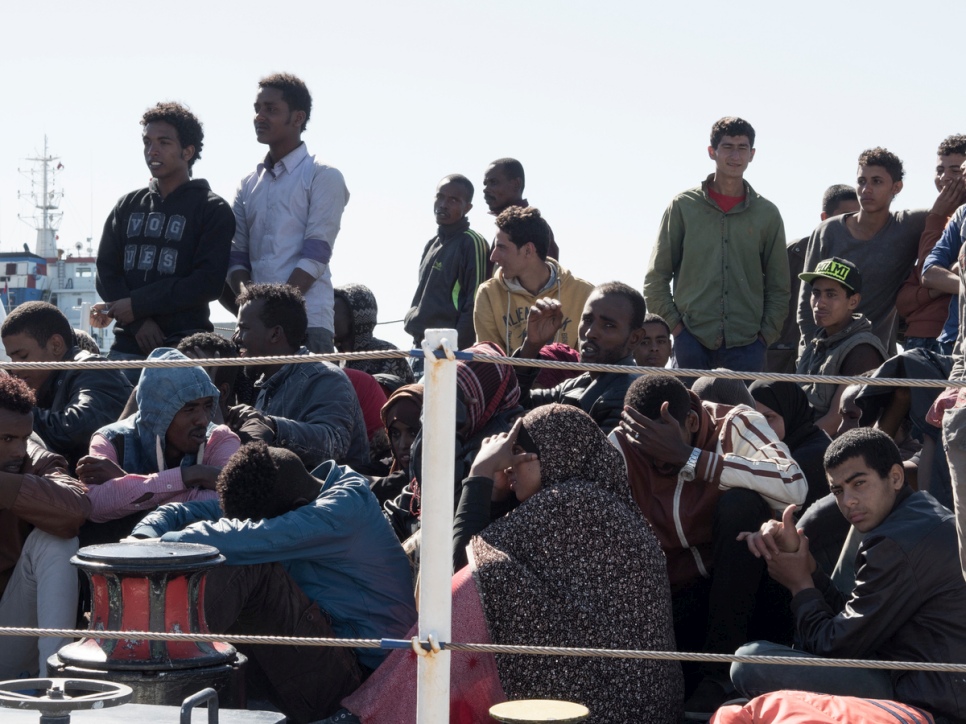Egyptian authorities rescue 150 people including Sudanese, Eritreans and Somalis after boat capsizes off Rosetta. At least 42 bodies have reportedly been recovered.

Refugees and migrants fleeing poverty and social unrest from Egypt, Somalia, Yemen, Sudan, Eritrea and Sierra Leone arrive in Port Augusta, Sicily, in this May 2016 file photo. © UNHCR/Patrick Russo
GENEVA – UNHCR, the UN Refugee Agency, is deeply saddened by the loss of life after yet another boat capsized in the Mediterranean, this time off the coast of Rosetta, Egypt, reportedly carrying around 450 people.
At least 42 bodies have reportedly been recovered and 150 people have been rescued in an operation by the Egyptian authorities involving the army and navy, UN spokesperson William Spindler told a news briefingin Geneva on Friday (September 23).
Of those rescued, 43 were non-Egyptians, including 26 Sudanese, 13 Eritreans, two Somalis, one Syrian and one Ethiopian.
“The Egyptian authorities have ordered police to arrest smugglers responsible for the deaths, opening an investigation into the incident, and to provide necessary care to the survivors,” Spindler told reporters at the Palais des Nations.
Egypt has a long history of providing asylum to refugees and at the same time is a traditional route of irregular migration to Europe by sea.
Since 2014, there has been a steady increase in the number of interceptions of refugees and migrants trying to leave Egypt in an irregular manner. For 2016 to date, over 4,600 foreign nationals, predominantly Sudanese, Somalis, Eritreans and Ethiopians, have been arrested for attempting irregular departure from the Northern Coast, which is 28 per cent more than the whole of 2015. The numbers in 2015 were also higher than 2014.
The overall number of irregular Mediterranean Sea arrivals in Italy was stable in the first eight months of the year at 115,068, compared to 116,149 in the January-to-August period of 2015.
The proportion of departures from Egypt to Italy has been volatile but rose to 9 per cent, as of July 31 2016, from 5 per cent a year earlier. On the Egypt to Italy route, a significant number of unaccompanied minors have been recorded.
“Increasing mixed migration flows through Egypt are of major concern to UNHCR. The loss of life faced by refugees and migrants on Mediterranean smuggling routes has increased,” Spindler said.
The total number of Mediterranean crossings this year is 42 per cent lower than during the same period last year – 300,000 compared to 520,000 – primarily as a result of fewer crossings to Greece.
Nevertheless, the number of people reported dead or missing so far this year (3,498) is only 8 per cent lower than the total number of casualties for the whole of 2015, at 3,771.
“At this rate, 2016 will be the deadliest year on record in the Mediterranean Sea,” Spindler said.
Meanwhile, UNHCR Egypt has observed that many refugees and migrants may be using Egypt as a transit country, highlighting the need to address the root causes of mixed migration in their countries of origin.
UNHCR works closely with the authorities to verify the registration status of refugees and asylum seekers in detention and to facilitate their prompt release.
The Government of Egypt typically releases individuals registered with UNHCR from detention after an average of 15 days, in accordance with its international obligations to protect the right of those fleeing conflict and persecution.
The UN Refugee Agency has observed that many attempt to depart again shortly after their release. Those who are not registered with UNHCR are at risk of deportation and UNHCR is concerned that there may still be asylum seekers among them and requests access to them.
During the period of detention, UNHCR and partners also provide detainees with all basic items, including food and medical support.
As of August 31, 187,838 refugees and asylum-seekers have been registered with UNHCR in Egypt. The largest number, 116,175 – or 62 per cent of the total – were Syrians, followed by 31,200 Sudanese, 10,941 Ethiopians, 7,254 Somalis, and 7,000 Iraqis, among others.


